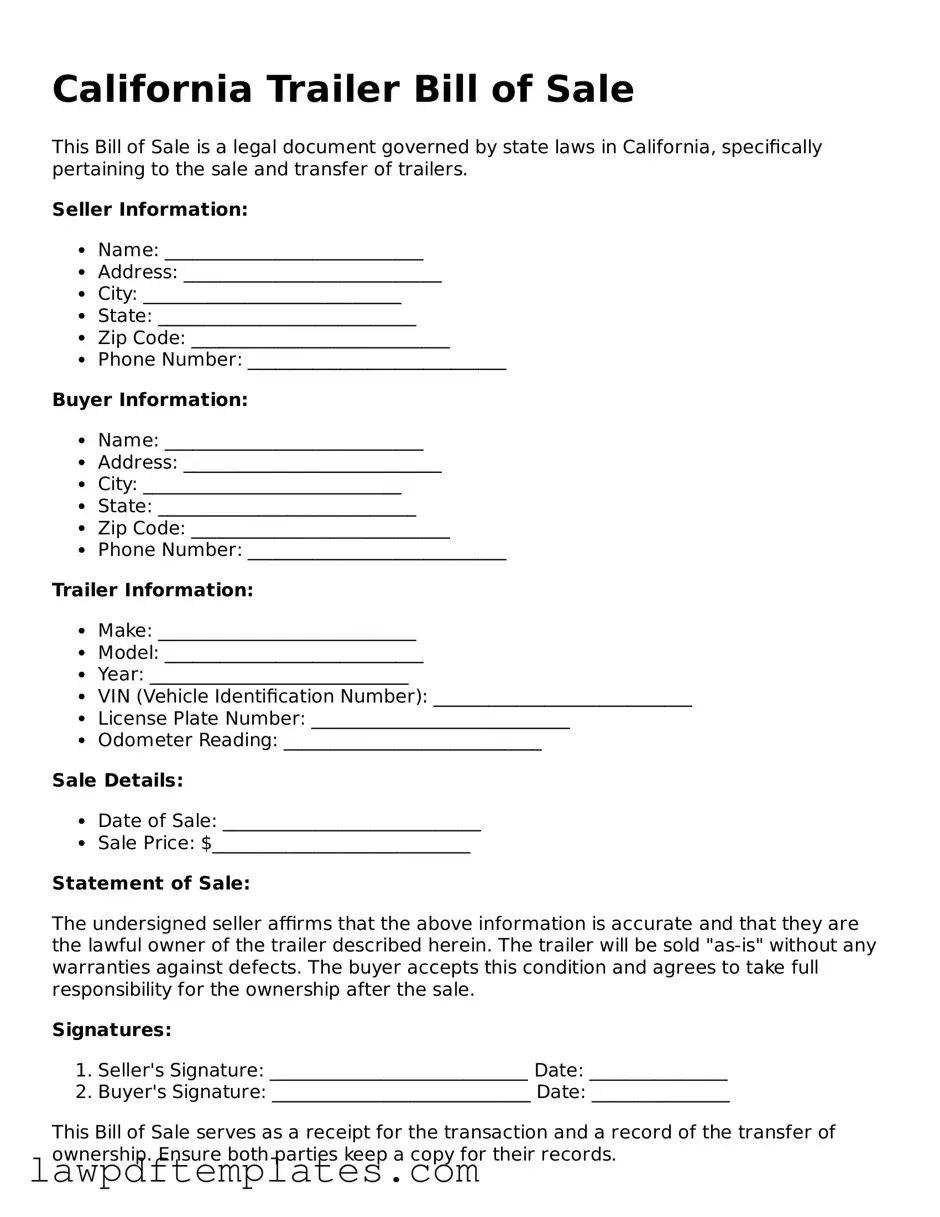Free Trailer Bill of Sale Template for the State of California
Form Breakdown
| Fact Name | Details |
|---|---|
| Purpose | The California Trailer Bill of Sale form is used to document the sale or transfer of ownership of a trailer in the state of California. |
| Governing Law | This form is governed by California Vehicle Code Section 5901, which outlines the requirements for the sale and registration of trailers. |
| Required Information | The form typically requires details such as the seller's and buyer's names, addresses, trailer identification number (VIN), and sale price. |
| Signatures | Both the seller and buyer must sign the form to validate the transaction and transfer of ownership. |
| Registration | After completing the form, the buyer must submit it to the California Department of Motor Vehicles (DMV) to register the trailer in their name. |
Sample - California Trailer Bill of Sale Form
California Trailer Bill of Sale
This Bill of Sale is a legal document governed by state laws in California, specifically pertaining to the sale and transfer of trailers.
Seller Information:
- Name: ____________________________
- Address: ____________________________
- City: ____________________________
- State: ____________________________
- Zip Code: ____________________________
- Phone Number: ____________________________
Buyer Information:
- Name: ____________________________
- Address: ____________________________
- City: ____________________________
- State: ____________________________
- Zip Code: ____________________________
- Phone Number: ____________________________
Trailer Information:
- Make: ____________________________
- Model: ____________________________
- Year: ____________________________
- VIN (Vehicle Identification Number): ____________________________
- License Plate Number: ____________________________
- Odometer Reading: ____________________________
Sale Details:
- Date of Sale: ____________________________
- Sale Price: $____________________________
Statement of Sale:
The undersigned seller affirms that the above information is accurate and that they are the lawful owner of the trailer described herein. The trailer will be sold "as-is" without any warranties against defects. The buyer accepts this condition and agrees to take full responsibility for the ownership after the sale.
Signatures:
- Seller's Signature: ____________________________ Date: _______________
- Buyer's Signature: ____________________________ Date: _______________
This Bill of Sale serves as a receipt for the transaction and a record of the transfer of ownership. Ensure both parties keep a copy for their records.
Common mistakes
Filling out the California Trailer Bill of Sale form can be straightforward, but many individuals make common mistakes that can lead to complications. One frequent error is failing to provide accurate vehicle identification information. This includes the trailer's Vehicle Identification Number (VIN), make, model, and year. Omitting or miswriting these details can create issues when registering the trailer with the Department of Motor Vehicles (DMV).
Another mistake occurs when individuals neglect to include the correct sale price. This figure should reflect the actual amount exchanged for the trailer. If the price is left blank or inaccurately stated, it may raise questions during the registration process or even affect taxes owed on the sale.
People often overlook the importance of signatures. Both the seller and the buyer must sign the bill of sale for it to be legally binding. In some cases, a seller may assume that a verbal agreement is sufficient. However, without signatures, the transaction lacks the necessary documentation to protect both parties.
Additionally, not dating the form is a common oversight. The date of the transaction is crucial for record-keeping and establishing when ownership changed hands. Without this date, disputes may arise regarding the timeline of the sale.
Many individuals also forget to provide their contact information. Including phone numbers and addresses can facilitate communication between the buyer and seller if any issues arise post-sale. This detail is often seen as minor, but it plays a significant role in ensuring a smooth transaction.
Lastly, some people fail to keep a copy of the completed bill of sale for their records. Retaining a copy is essential for both parties. It serves as proof of the transaction and can be useful if any questions or disputes come up in the future. Keeping thorough documentation helps safeguard against potential misunderstandings.
Discover More Trailer Bill of Sale Templates for Specific States
Title Transfer Bill of Sale Az - Vital for both party's record-keeping purposes.
State of Georgia Bill of Sale - Can assist in resolving potential legal issues later.
The IRS Form 2553 is a crucial document used by eligible small business corporations to elect S corporation status for tax purposes. By filing this form, businesses can potentially enjoy tax benefits, such as avoiding double taxation on corporate income. For those looking for guidance, resources like Fast PDF Templates can be beneficial in ensuring accurate and compliant submissions. Understanding the form and its requirements is essential for any small business looking to optimize its tax strategy.
New Jersey Trailer Bill of Sale - Includes identification information for both parties.
